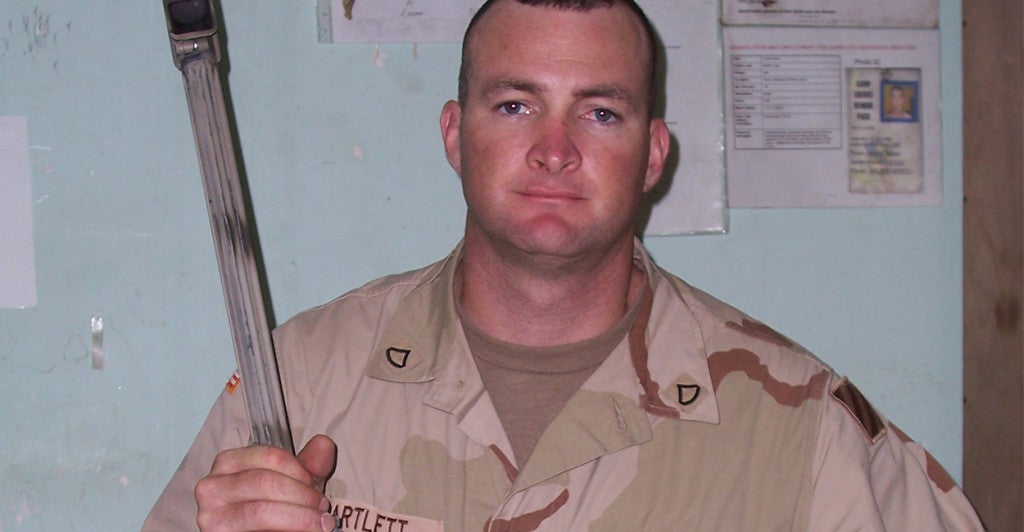It was not difficult for retired Staff Sgt. Robert Bartlett and his wife to settle on a name for their newborn son two months ago.
“I named my son after my buddy who was killed next to me [in Iraq],” Bartlett says, referring to the fateful day in May of 2005 when he says an Iranian roadside bomb tore into their Humvee. “Staff Sgt. William Brooks. That was his name. And William, in Irish, is Liam.”
The explosion that claimed Brooks’ life also cost Bartlett dearly. The then 30-year-old’s face was torn in half from the left corner of his temple down through his jaw; he was declared deceased three times by medical personnel over the course of his treatment as a result of internal bleeding from ball bearings that had penetrated his chest and body.
The Humvee’s “gunner,” the lookout atop the vehicle, lost his legs in the explosion.
Ten years later, Bartlett is recovered, retired, and a proud new father, personally poised for a joyous phase of life. But publicly, he has spent much of his recent time in another type of battle, a political one fought not on desert roads, but in congressional hallways.
A photograph of Staff Sgt. Bartlett’s Humvee after it was hit by a roadside bomb. (Photo: Staff Sgt. Robert Bartlett)
Bartlett this summer joined the Veterans Against the Deal movement—coalition of veterans who believe that the Iran deal would be a grave misstep for the United States—to, as he explains, protect the United States and the safety of American citizens.
“I took an oath to support the United States and to protect them, and that’s what I’m still doing to this day,” he says, asking, “How is giving $150 billion to the very men who killed Americans and have American blood on their hands going to stop any of it?”
It would be hard to argue that Bartlett is not able to offer a unique perspective on both Iranian weaponry and American liberty.
“When the director [of Veterans Against the Deal], Michael Pregent, reached out to me, he knew I’d been hit by an Iranian bomb,” Bartlett says. “Our focus is to inspire Americans that we gave them a voice, and we gave them the freedom to say something and speak up. We can’t, as Americans, be quiet when tyranny is at our door.”
Bartlett has appeared on television opposing the Iran deal. He believes that the deal’s supporters “need their heads examined.”
“They could walk away from the deal once they get the money,” Bartlett says. “That’s how scary it is, and that’s the option they have. We have got to keep that in mind.”
Bartlett spent an afternoon last month with retired Navy SEAL and former explosive ordnance (EOD) technician Ken Stethem, a fellow Veterans Against the Deal member whose brother was killed by Hezbollah terrorists in a 1985 plane hijacking. The two banged on the doors of senators and congressmen in a last-ditch effort to sway the deal’s course.
In September, after Democrats succeeded in blocking a Republican resolution against the deal, President Obama called the agreement a “victory for diplomacy.”
In Bartlett’s view, the Iranians are already breaking the deal’s terms.
“[Maj. Gen. Qassim] Suleimani’s traveling,” he says. “He’s secured S-300 [missiles]. That’s breaking the deal right there. He’s not supposed to be doing any of that.”
Despite last month’s resolution rejection, Bartlett says the Veterans Against the Deal will not stop fighting to be heard.
“What hit me in the head killed my buddy, and I have to be a voice for him,” Bartlett says. “My buddy doesn’t get to walk his girls down the aisle, so I have to stand up.”
